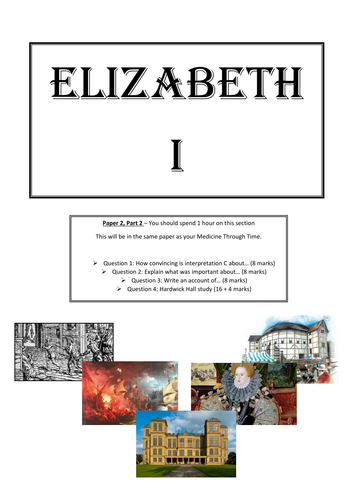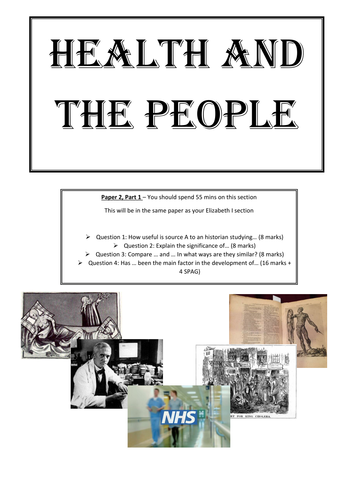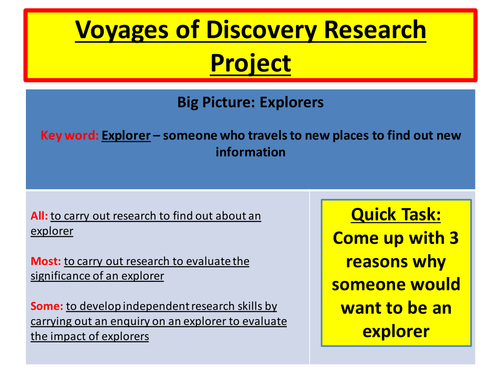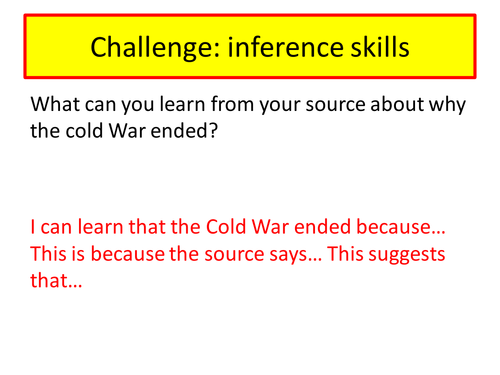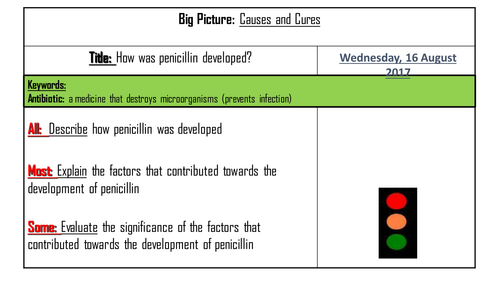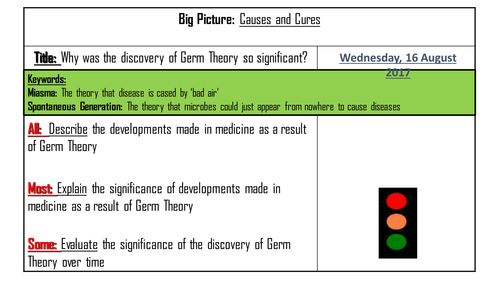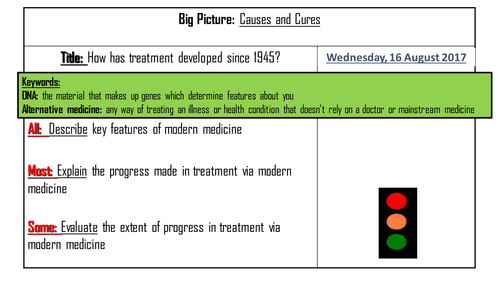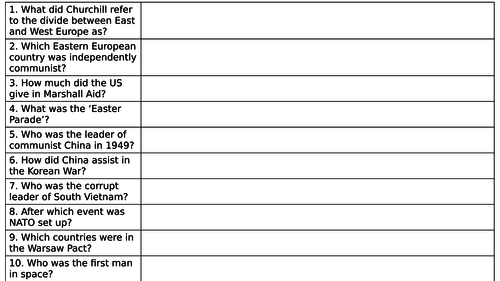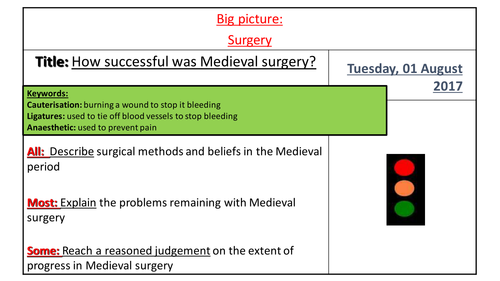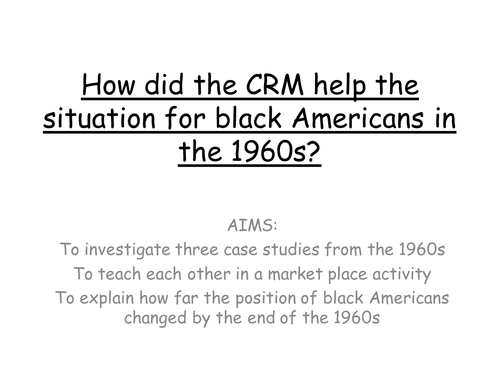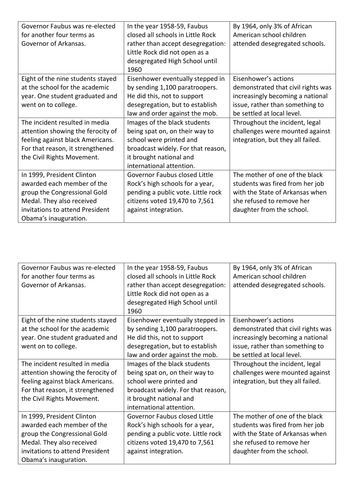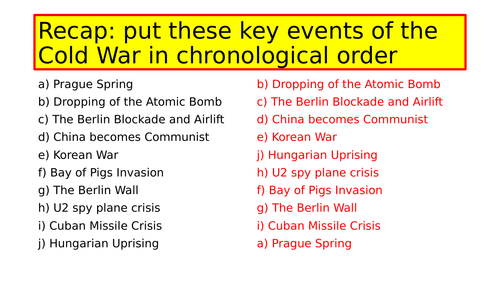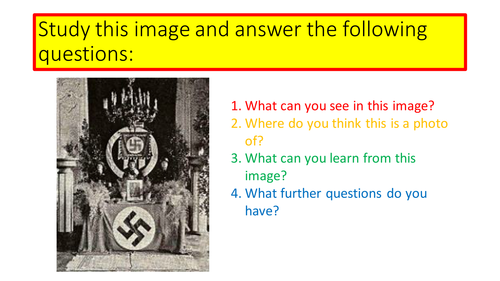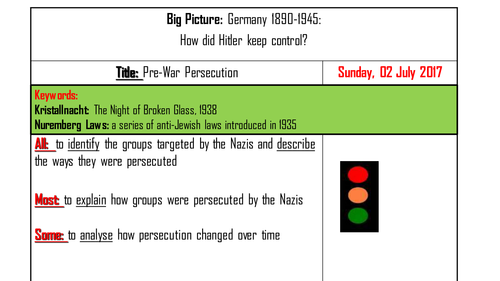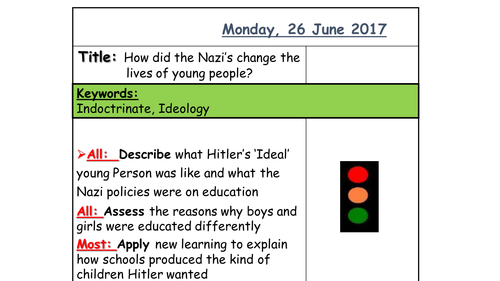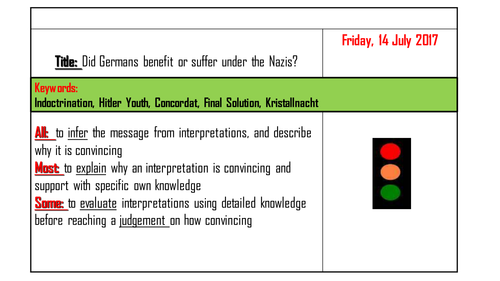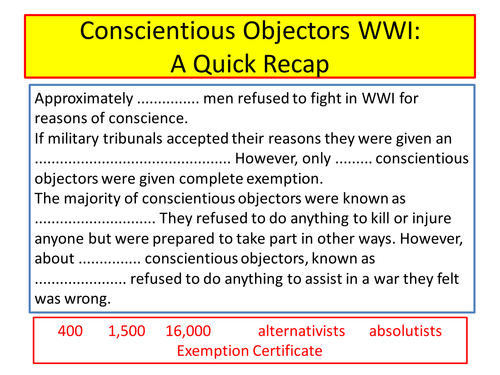
170Uploads
39k+Views
18k+Downloads

Explorers research task - 4 lesson series
A differentiated research task, ideal for ks3 students to promote independent learning. Students are given clear guidance as to what to include in their project, which can be peer or self assessed at the end. The research task is broken down so that students know what they need to have achieved in each lesson.

Industrial Revolution - Did life improve?
A KS3 lesson which summarises the improvements during the Industrial revolution. Includes a living graph, and requires students to categorise and prioritise the changes which occurred. Works best as a summary lesson after completing a unit of work on the topic.

Causes of the end of the Cold War
A differentiated lesson on the causes of the end of the Cold War. Includes a card sort for students to categorise and differentiated data capture worksheets for students which build key skills for essay writing.

AQA 8145 Medicine - Development of Penicillin
A GCSE lesson in which students explain and evaluate the role of key factors in the discovery and subsequent development of penicillin before using their understanding to complete an 8 mark 'compare' exam style question.
Bundle

AQA 8145 Medicine - Understanding Causes and Cures of diseases since Germ Theory
A series of GCSE lessons taught thematically on the developments in understanding the causes of diseases, and finding cures for diseases since the advent of Germ Theory. Includes practice exam questions in line with the AQA specification.

AQA 8145 Medicine - Germ Theory and the development of Vaccines
A GCSE lesson in which students examine the subsequent development of vaccines after the development of germ theory. Students will explicitly consider the long term significance of the discovery of germ theory in preparation for an 8 mark exam style question. Includes differentiated resources for students to consider the role of key factors in the development of vaccines.

AQA 8145 Medicine - Modern Treatment
A GCSE lesson in which students examine several strands of development of modern medicine to consider the impact on treating diseases. Students will evaluate the extent to which these measures have led to progress in health and life expectancy before reviewing change in understanding causes and cures of diseases over time.

AQA 8145 Conflict and Tension: Cold War 1945-1972 - The Cuban Missile Crisis
A GCSE lesson in which students use a living graph to evaluate the extent to which the world was on the brink of war as the events of the Cuban Missile Crisis unfolded. Includes practice and guidance for an 8 mark 'write an account' exam style question for the new GCSE exams.

AQA 8145 - Conflict and Tension: Cold War - The Arms Race
A GCSE lesson in which students will understand the importance of the arms race within the context of the Cold War. Includes a range of tasks in which students will gain the required understanding, and a number of tasks to develop specific source skills for their GCSE course.

AQA 8145 Medicine - Medieval Surgery
A GCSE lesson in which students will consider the progress and limitations of Medieval surgery. Students will consider how successful Medieval surgery would have been by comparing to necessary factors in modern day surgery in order to analyse the limitations.

Civil Rights Movement - protest in the 1960s
A 2 lesson series in which students consider the effectiveness of methods of protest in the 1960s: freedom rides, freedom marches and the black power movement. Includes a variety of activities which students can complete in a carousel across 2 lessons.

Civil Rights Movement - Consequences of Little Rock
A follow up lesson in which students examine the consequences of Little Rock and therefore its significance for the Civil Rights Movement. This lesson will also act as a summary in which students consider the progress made by the CRM by the end of the 1950s.
Bundle

Civil Rights Movement - Protest in 1950s
A series of lessons in which students examine the significance of 3 key events during the 1950s. Students will use these to assess the extent to which life had improved by the end of the decade.

AQA 8145 - Conflict and Tension Cold War: Consequences of the Prague Spring
A GCSE lesson in which students consider the impact of the Prague Spring. Students will consider a 16 mark exam question on the main consequences of the Prague Spring by gathering relevant information to support key consequences before reaching a judgement on the most important consequence.

AQA 8145 Germany - The Christian Church Concordat
A GCSE lesson which examines Nazi policy towards the Christian Church in Germany. Students will evaluate the reasons for the Concordat and the extent to which the Nazis were successful in controlling the Church.
Bundle

AQA 8145 Germany - Social policy
A three lesson series of GCSE lessons examining the impact of Nazi social policy on youth, women and the Church. Includes exam questions specific to the AQA GCSE exam.

AQA 8145 Germany - Pre-war Persecution
A GCSE lesson looking at the persecution of various groups in Germany, including a more detailed analysis of how persecution of Jews changed over time up until 1939. Students will understand the reasons behind the persecution and categorise them, and create a timeline of Jewish persecution.

AQA 8145 Germany -Nazi Education
A GCSE lesson in which students analyse the ways that the Nazis controlled education. Students will evaluate the effectiveness of Nazi methods of control.

AQA 8145 Germany - Did Germans benefit or suffer
A summary GCSE 1-2 lesson series for the section of the specification for AQA on social policy. Students will analyse interpretations about whether people benefited or suffered under Nazi rule according to social policy. Students will prepare an answer to the 8 mark question asking 'Which interpretation do you find more convincing about...'. Includes differentiated resources for high, middle and low ability students.

Crime and Punishment - Conscientious Objectors WWII
A GCSE lesson on conscientious objection in WWII. Students will compare COs in WWI and WWII. They will evaluate the extent to which the attitudes of the government and the public changed.

